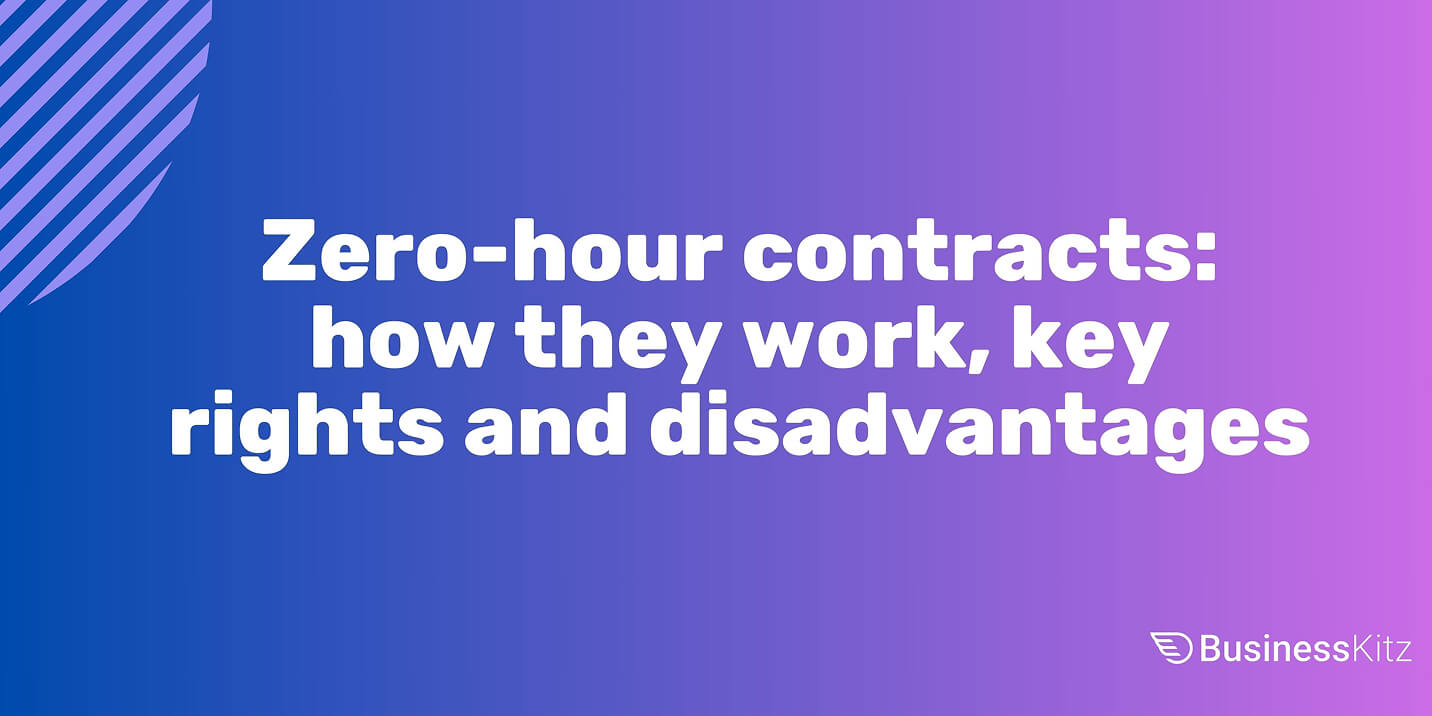
We've helped businesses save $55m with our all-in-one platform. Get instant access to this template and 115+ others, plus AI-powered document creation, starting completely free.
Zero-hour contracts allow businesses to manage staffing needs efficiently while giving workers the option to accept or decline shifts. However, these contracts do not guarantee a set number of hours, leaving workers with unpredictable income and limited job security. Many also miss out on key benefits like holiday pay and sick pay.
Industries such as hospitality, retail, healthcare, and the gig economy commonly use these contracts to handle fluctuating demand. While businesses save costs by only paying for hours worked, workers may struggle with financial stability due to inconsistent schedules.
This guide explores how zero-hour contracts work, their advantages and disadvantages, key employment rights, and best practices for businesses. Understanding these contracts helps both employers and workers make informed decisions.
A zero-hour contract is a type of employment contract where an employer is not required to provide a fixed number of working hours. Instead, work is offered based on demand. Workers may be available for shifts but are not obliged to accept them unless stated in their contract.
[ez-toc]

A zero-hour contract is a type of employment contract where an employer is not required to provide a set number of working hours. Instead, work is offered as needed. Workers may be available for work but are not always obliged to accept shifts.
Many industries use zero-hour contracts, especially those with fluctuations in demand. These contracts help businesses respond quickly to staffing needs. They are common in:
These contracts benefit businesses needing flexible staffing solutions but may leave workers without stable income or employment rights.
Workers under a zero-hours contract have different rights compared to those in traditional contracts. Unlike full-time or part-time employees, they do not have set hours. Casual workers also lack set hours but often have more legal protections.
Employment TypeGuaranteed HoursEmployment StatusEntitlements (e.g. holiday pay, sick pay)Full-timeYesEmployeeYesPart-timeYes (fewer than 38 per week)EmployeeYesCasualNoEmployee or a workerLimited entitlementsZero-hour contractNoEmployee or workerLimited and varies by contract
Workers should carefully review their employment contract to understand their rights and obligations.
A zero-hour contract offers flexibility but also presents risks. Employers and workers must weigh the advantages and disadvantages before agreeing to this type of employment contract.
Employers may choose zero-hour contracts to:
Many workers on zero-hour contracts enjoy:

Despite flexibility, employers must consider risks such as:
People on zero-hours contracts face:
Workers on zero-hour contracts in Australia have rights, but these depend on their employment status. A worker may be classified as an employee or a contractor, which affects their entitlements under Australian employment law.
Workers under a zero-hour contract may receive:
Workers should review their employment contract to understand their rights. If unsure, they should seek legal advice. Employers must comply with Fair Work laws to ensure workers are treated fairly.

Employers must follow good practice when hiring workers on zero-hour contracts. Clear communication, fair treatment, and legal compliance help build trust and reduce risks. Businesses that treat workers well attract skilled staff and maintain a strong reputation.
Employers should:
A zero hour contract does not guarantee shifts, while full-time work provides consistent hours and income. Full-time employees working at least 30 hours per week receive job security, benefits and legal protections. Contract workers under zero hour agreements may not have the same entitlements as full-time staff.
The disadvantages of zero-hours contracts include unstable income, lack of career progression and limited access to employment rights. Workers seeking full-time employment may find it hard to secure permanent roles. CIPD research highlights that workers under these contracts often experience lower job security and reduced benefits.
Yes, employers can offer or withdraw shifts based on business needs. However, they must follow fair work laws. The Employment Rights Act 1996 protects workers from unfair treatment. Employers should ensure their employment relationship with staff is clear and legally sound.
Yes, agency workers can be hired under zero-hours contracts. However, their rights may differ from direct employees. The Employment Rights Bill, which received royal assent, aims to strengthen worker protections, especially for agency workers and young workers.
Yes, but protections depend on the worker’s employment status. In Australia, casual workers—who often work under zero-hour contracts—have fewer rights than permanent employees. While casuals do not receive paid leave or redundancy protections, they are entitled to a casual loading to compensate for these gaps.
Young workers have the same basic rights as other workers. However, employers must follow legal age restrictions and ensure safe working conditions. MP Julian has raised concerns about the impact of these contracts on young workers’ job stability and career growth.
No, unless the contract specifically states that workers must accept shifts. Mutual agreement is key to fair working conditions. Workers should review their contracts carefully before agreeing to any commencement of work.
A zero-hour contract can offer flexibility but also presents risks. Workers must understand their employment rights and entitlements, including holiday pay, sick pay, and minimum wage protections. Employers must follow employment law and ensure contracts are clear, fair, and legally compliant.
Businesses benefit from zero-hours contracts when they use them ethically. Fair scheduling, open communication, and access to worker protections help maintain trust. Poor practices can lead to legal issues and damage an organisation’s reputation.
Employers should seek legal advice to ensure compliance with workplace laws. Using trusted contract solutions like Business Kitz helps businesses manage agreements, protect worker rights, and avoid disputes. A fair and transparent approach benefits both employers and workers in the long run.
Copyright © 2025 Business Kitz 14312161